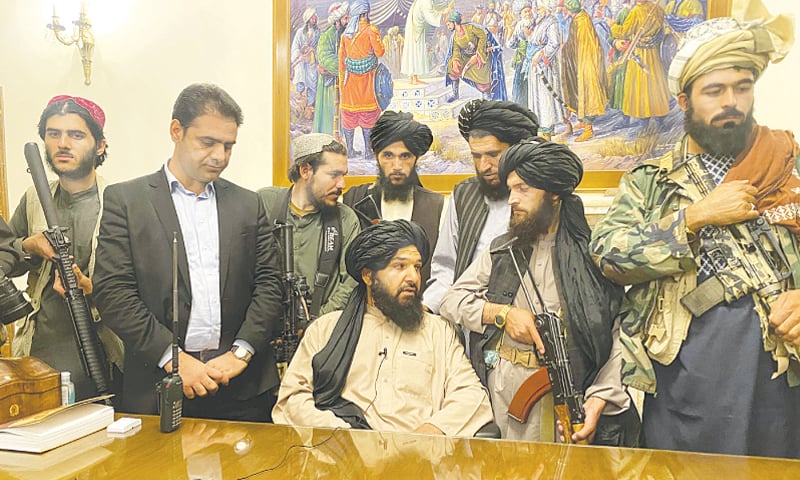Grave suspicions are mounting regarding Pakistan’s alleged role in covertly assisting Al Qaeda in re-establishing itself in Afghanistan.
Pakistan has long had a close relationship with Al Qaeda, with several of its political leaders and military generals either directly supporting or collaborating with Al Qaeda leader Osama bin Laden. Bin Laden was found sheltering in a high-security zone in Abbottabad, a Pakistani garrison town, leading to widespread belief that he was protected by the Pakistan military.
After two decades of lying low, Al Qaeda is beginning to resurface from caves and hidden valleys in Afghanistan, re-establishing its presence with the aid of the Afghan Taliban, who now govern Kabul, much like they did before September 2001. The global terrorist organisation had orchestrated the 9/11 attacks from these Afghan strongholds.
Although there is no conclusive evidence of Pakistan’s direct involvement in aiding Al Qaeda’s resurgence in Afghanistan, a recent report by the United Nations Analytical Support and Sanctions Monitoring Team raises serious suspicions. The report suggests possible proxy support from the Taliban to enable Al Qaeda to operate training camps in Kandahar and Takhar provinces. These camps are in addition to those identified in ten other provinces over the past year. The recent 1267 report, released on July 10, pointed out that Al Qaeda operated camps in Afghanistan’s 34 provinces including Ghazni, Laghman, Parwan, Uruzgan, Helmand, Zabul, Nangarhar, Nuristan, Badghis, and Kunar.
The UN report has blamed the Taliban regime for failing to restrain Al Qaeda despite claims and protestations. The report acknowledges inputs from various member states stating that Al Qaeda’s reorganisation and training activities, as well as new travel into Afghanistan, indicate that the Taliban has allowed the terrorist outfit to renew its terror activities in its old strongholds.
What the UN report ignores to mention specifically is the role played by Sirajuddin Haqqani, the supremo of the notorious Haqqani Network which has been a key figure of support of Al Qaeda since its birth. Haqqani is the Interior Minister in the Kabul regime. His ties to Pakistan Army and ISI is what needs to be taken into account. Although there is a growing conflict between the two erstwhile allies, little is known about Haqqani’s current relationship with ISI and Pakistan Army.
What is known is that ISI has had a continuing relationship with Sirajuddin Haqqani and his network for various interests. During the prolonged negotiation with the militant group, Tehreek-e-Taliban Pakistan (TTP), a major security challenge for the army, the ISI was working closely with the Haqqanis to persuade the Taliban regime to rein in the terrorist group. The TTP has been targeting the security forces since 2007 and has survived several previous military offensives, only to bounce back and establish itself as a potent force along the Durand Line. The TTP has also worked closely with Al Qaeda and the Haqqani Network besides aiding Pakistan Army-supported Taliban offensive against the US-led western forces. The Haqqanis had helped the Pakistan Army to reach an agreement with TTP which the terrorist outfit broke off in November 2021, months after the Taliban won Kabul. The then ISI chief, Lt. General Faiz Hameed and his boss, General Qasim Javed Bajwa, had a good working relationship with the Haqqanis. Several army and ISI officials, involved in the relationship with the Taliban and the Haqqanis, are active in the army under General Asim Munir.
Way back in 2009, the then US Secretary of State Hillary Clinton had alleged that ‘some Pakistani officials bore responsibility for allowing terrorists from Al Qaeda to operate from safe havens along this country’s frontier’. Even the Abbottabad report, produced by an ad hoc commission of Pakistani officials, does not exclude the possibility of complicity by elements of the ISI in protecting Al Qaeda chief Osama bin Laden.
Another significant factor is the army’s desperate attempt to quell the resurgence of TTP in Pakistan’s tribal areas which has caused heavy casualties among the police and security personnel in the last two years. With the Taliban refusing to tow the Islamabad line, the army is using its domestic terrorist allies like Lashkar-e-Tayyeba (LeT) and Jaish-e-Mohammad (JeM) to reach out to Al Qaeda which still retains significant influence among the extremist Islamic groups across the world, including Afghanistan.
These groups may have helped Al Qaeda to establish safe houses, religious schools, a media operations centre, and a weapons storage facility. The Taliban has similar safe houses in Farah, Helmand, Herat, and Kabul. Ayman al Zawahiri, the co-founder and former emir of Al Qaeda, was killed in a US drone strike on one such safe house in Kabul in July 2022. This safe house was operated by a lieutenant of Sirajuddin Haqqani. According to the UN report, the safe houses in Farah, Helmand, and Herat were used by Al Qaeda “to facilitate the movement of members between Afghanistan and the Islamic Republic of Iran.” Al Qaeda is also operating madrasas in Laghman, Kunar, Nangarhar, Nuristan, and Parwan provinces. In Panjshir province, a former stronghold of the anti-Taliban National Resistance Front, Al Qaeda has established a base to stockpile weapons.

